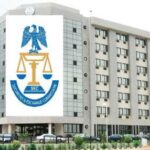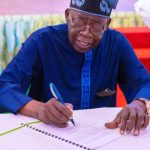Ex-soccer star ‘King George’ nears goal of Liberia presidency
 George Weah has been here before: on the goal line of the Liberian presidency, one run-off vote from victory. Unlike in 2005, however, his support is much wider and many expect him at last to succeed.
George Weah has been here before: on the goal line of the Liberian presidency, one run-off vote from victory. Unlike in 2005, however, his support is much wider and many expect him at last to succeed.
The 1995 European soccer player of the year won 39 percent of votes in first round presidential polls last week, with 95 percent of votes counted. The final result is due on Wednesday.
That was 10 percentage points more than closest rival Vice President Joseph Boakai, and a better score than he had in earlier contests, but short of the 50 percent needed to win.
A run-off between Weah and Boakai will be held in November.
The result shows how support has grown steadily for the former AC Milan striker, who lit up television screens in Liberia in the 1990s with his mazy runs, briefly distracting fans from a 1989-2003 civil war that killed tens of thousands.
Now “King George”, as his supporters call him, has to persuade the majority that he can run a country as well as he kicks a ball.
His rhetoric has been light on policy so far. In an interview on Oct 8 he spoke vaguely about a need for better roads.
“We will seek a government of inclusion where everyone can work together and make our country a better one for all of us,” he told Reuters.
Weah grew up in Clara Town slum in the capital Monrovia, playing football there and in Cameroon, where manager Arsene Wenger spotted him and took him to Monaco. He went on to play for Milan and Paris St Germain, and later in his career for Chelsea, Manchester City and Marseille.
He became the first non-European to win the Ballon d‘Or in 1995, the same year he picked up the African and world player of the year awards.
His rags-to-riches story has inspired supporters from similarly lowly backgrounds.
“Weah is grass roots, a son of the soil – he is a star, but he has the country at heart,” said Oliver Myers, an unemployed 39-year-old from the Rehab neighborhood outside Monrovia.
Others are wary of his lack of political experience and education, and question his ability to govern a country that remains 12th from bottom of the U.N. Human Development Index.
“Weah’s populism and inability to articulate a coherent platform … are deeply concerning,” said Liberian political analyst Robtel Neajai Pailey in a recent opinion piece for Liberian website The Bush Chicken.
“Success at football does not translate into success in the presidency of a traumatized, poorly managed, post-war nation.”
“THERE FOR US”
Doubts over Weah’s experience could still sink his ambitions in next month’s run-off, as in 2005, when he won the first round but lost the second to Ellen Johnson Sirleaf, the Nobel Peace Prize winner who went on to rule for 12 years.
Weah refused to take part in televised debates attended by most other major candidates, and his choice of running mate Jewel Howard-Taylor – ex-wife of Charles Taylor, the former president and warlord serving 50 years in Britain for war crimes in neighboring Sierra Leone – has raised eyebrows.
Johnson Sirleaf was credited with shoring up peace after the civil war, but criticized for failing to tackle elite graft and doing little to lift most Liberians out of poverty.
Development has been hindered by an Ebola outbreak and a drop in the price of iron ore. Poor roads still leave most of rural Liberia stranded during the rainy season, often without electricity. In Monrovia, where derelict buildings line the main highways, most live on pitted dirt streets with little access to clean water.
Boakai, 72, Sirleaf’s deputy for 12 years, has struggled to separate himself from her during his campaign, despite promoting his humble beginnings.
As Weah gained popularity, he was elected to the Liberian senate in 2014, defeating the president’s son Robert Sirleaf.
He still plays football every Sunday in Monrovia.
“While people have reservations about his lack of education, he is seen as the candidate for change,” a diplomat told Reuters on Monday.
“It will take a lot for Boakai to turn this one around.”
Thomas Kojo, who played with Weah on the Liberia national team, thinks his former teammate’s passion for his country will take him far.
“The heart George has for Liberia is unbelievable,” Kojo said in an interview outside Weah’s compound in Rehab on Monday. “He made sure the national team was always trying to bring (home) some pride.”
Weah paid for the national team’s kit when the Football Association couldn’t afford it during the war, and gave players up to $600 spending money and similar bonuses if the team won, Kojo said. He once chartered a flight for the team when they were stranded in Ivory Coast without a flight to a game.
“The football team was the only good image to come from Liberia when all people saw was the killing,” Kojo said.
“He made sure he was there for us.”REUTERS








